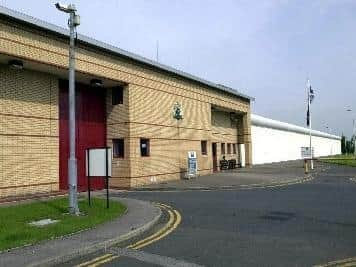Coroner raises concerns over prison failures before Garth inmate took his own life
and live on Freeview channel 276
The death of Andrew Patrick Jones, who was serving a sentence at HMP Garth near Leyland, prompted Dr James Adeley, Senior Coroner for Lancashire and Blackburn with Darwen to pen his concerns in a damning report, stating: " In my opinion there is a risk that future deaths will occur unless action is taken."
He found that the 37-year-old was illegally held in isolation, during which he didn't have any physical or mental healthcare assessments, shower access, exercise, or telephone calls.
Advertisement
Hide AdAdvertisement
Hide AdMr Jones suffered withdrawal symptoms when his supply of opiates for severe back pain, and prescription of a medicine to stabilise his moods, were "suddenly withdrawn without healthcare involvement".


Less than a month before his death he had self harmed due to pain issues relating to his medication being reduced in favour of remedial gym and physiotherapy work.
The report reveals an altercation, involving only Mr Jones, on November 21 led to him being moved from B wing into segregation on C wing, but a hearing to deal with that, scheduled for the following morning, was delayed after other hearings overran. Staff on C Wing were not told about the risks to his health.
Mr Jones was not kept informed properly and remained in isolation - something Dr Adeley found was a clear breach of prison rules.
Advertisement
Hide AdAdvertisement
Hide AdOn B Wing, officers would shout out that medication was now available for pick up, with inmates then buzzing to be unlocked from their cells - but this practice did not happen on C Wing, where the cells of those on a healthcare list to collect their medication would be unlocked.
Due to his rapid transfer on November 21, he was not on the healthcare list and received no medication.
The regulation 28 report, aimed at preventing future deaths in similar circumstances, came as a result of a three week jury inquest in March which concluded a failing by senior management to ensure understanding of, proper use of, and monitoring of" the segregation rules contributed to Mr Jones' suicide.
In it, Dr Adeley said there was "no legitimate reason" to segregate Andrew, as nobody else was involved in the previous day's incident, and so he could not collude with or intimidate anyone.
Advertisement
Hide AdAdvertisement
Hide AdHe remarked the "risk averse nature of the prison service has been substantially reduced over the last 5-6 years to one in which risk is routinely ignored", and added: "Five years ago I rarely saw any deaths from HMP Garth and those that I undertook were normally well-managed. This demonstrates a substantial alteration as to how the jail approaches risk."
The report lists several failures to assess risk at different stages of his incarceration, and noted: "The unlawful detention had pre-existed the date of death for approximately three years across almost every wing in the jail and may have been applied to 6-700 prisoners, the number being unable to be ascertained due to a lack of prison records.
"The expert psychiatric evidence stated that the prison regime created "the perfect storm" and the jury concluded that this contributed to the death and also added the rider of neglect to indicate the failure to provide basic care by the Prison Service."
Dr Adeley reports that the first indication that healthcare staff were aware of Andrew being on C Wing was at midday on November 22; more than 24 hours after being moved there.
Advertisement
Hide AdAdvertisement
Hide AdHe also criticised the failure to assign him a Personal Officer, who would have interacted with him regularly.
The report, addressed to National Offender Management, was sent to Mr Jones' father, as well as the Chief Coroner, Inquest, the Prison Reform Trust and HM Inspectorate of Prisons.